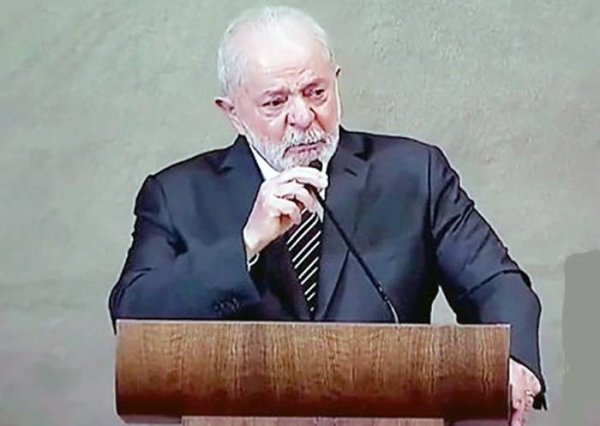
One of Brazil’s leading newspapers has launched a major pro-democracy campaign as unease grows about the threat many fear Jair Bolsonaro and his most militant supporters pose to the country’s political future.
Unveiling the initiative on Sunday, the Folha de São Paulo said systematic attacks from pro-Bolsonaro extremists were putting Brazilian democracy through its greatest “stress test” since the return of civilian rule in 1985.
The broadsheet urged readers to wear yellow in support of democracy and said voters needed to urgently remember the dark days of Brazil’s 1964-85 military regime, when hundreds of political opponents were killed or disappeared.
“We saw, and will never forget, the horrors of dictatorship, and we will always champion democracy,” the Folha de São Paulo declared.
The century-old publication announced that until Brazil’s next elections it would change the motto on its masthead from “a newspaper at the service of Brazil” to “a newspaper at the service of democracy”. It would also offer a free online course examining the social, economic, environmental, cultural and political impact of the dictatorship.
Folha’s editor-in-chief, Sérgio Dávila, said the campaign was born out of the realisation that more than half of the country’s population were too young to remember a period that for all its abominations is still celebrated by Brazil’s far-right leader and many of Bolsonaro’s devotees.
Some Brazilians had been “contaminated by a romantic, fanciful and perhaps even a little idyllic” notion that the two-decade dictatorship was a corruption-free heyday of security and social stability,” said Dávila, who was born in 1965 and grew up in a country ruled by generals.
“But this is all a lie. People were afraid to speak, to express themselves, to criticise the government. People were afraid of coming together to say what they really thought.”
The idea had been to almost to produce a guide for millennials, he said. “Understand what the dictatorship did so we don’t repeat it.”
Bolsonaro, a former army captain and longtime champion of Brazil’s military rulers, was improbably propelled into the presidency in 2018 by an explosion of voter anger against the political establishment.
He has packed his cabinet with military men, and in recent months he has attended a series of anti-democracy rallies, including one outside the Brazilian army headquarters in the capital, Brasília.
Hardcore supporters at the rallies held up banners demanding the closure of democratic institutions and the return of a dictatorship-era decree used to crack down on opponents in the late 1960s.
One small group of pro-Bolsonaro radicals, whose members were subsequently arrested, tried to storm congress and launched fireworks at the supreme court earlier this month.
Prominent bolsonaristas, including the president’s national security chief and his son, have also hinted that some form of military takeover could be on the cards.
Many observers see the anti-democratic rhetoric as a Bolsonaro ploy to bully the supreme court. Its investigators are reportedly closing in on several of the president’s relatives and backers as part of an inquiry into an online disinformation campaign.
The provocations have, however, stirred fears of a return to military rule and spawned a growing number of pro-democracy coalitions involving figures from both left and right. Those initiatives include a recent manifesto inspired by Diretas Já – a historic pro-democracy movement that helped to end the dicatorship.
“Just as there was this broad coalition to defeat the dictatorship, we believe we must now build a broad coalition to avoid a new dictatorship,” one signatory, the leftwing politician Flávio Dino, told the Guardian.
Dávila said Folha’s campaign was also modelled on Diretas Já, including its decision to “rescue” the colour yellow as a symbol of democracy.
Under Bolsonaro, Brazil’s yellow and green flag and yellow football shirt have become unmistakable emblems of support from the rightwing populist. He still enjoys the support of about 30% of the population, but is increasingly rejected by the other 70%.
Folha put the slogan “Wear yellow for democracy” on its Sunday front page and website. “Our view is that yellow belongs to neither conservatives nor progressives. It should represent the fight for democracy,” Dávila said.
He said his newspaper was alarmed at the blossoming of radical pro-dictatorship movements, and the “certain acquiescence” Bolsonaro had demonstrated by attending their rallies.
“Brazil’s young democracy is facing its greatest stress test,” he said. “But it is responding well. Our institutions are working. The system of checks and balances has been working. All three branches of power have retained their independence … and the press has also been playing an important role.
“There is great tension in the air, but I feel optimistic rather than pessimistic.”












